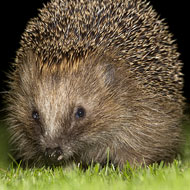British hedgehog classed as vulnerable to extinction

"It is not enough to rely on the goodwill of individuals to protect this important creature" - BHPS.
The British hedgehog has been officially classed as vulnerable to extinction in the UK by the International Union for the Conservation of Nature (IUCN).
According to a report by the Mammal Society, one-quarter of all British mammals are now on the brink of disappearing altogether, including the red squirrel, Eurasian beaver and the grey long-eared bat.
The British Hedgehog Preservation Society (BHPS) said the hedgehog's inclusion on the Red List for Britain's Mammals provides an opportunity to increase awareness of protecting hedgehog habitats, and to raise the importance of keeping these habitats connected.
The charity is calling on MPs to increase the protection offered to the hedgehog under the Wildlife and Countryside Act by moving it to schedule 5, allowing the level of protection appropriate for such a keystone species in decline.
“What people do on behalf of the hedgehog is amazing,” said Fay Vass, CEO of the BHPS. “The holes made in fences, the feeding, the hedgehog houses, the wildlife-friendly planting, the removal of hazards - all makes such a difference locally.
“But it is not enough to rely on the goodwill of individuals to protect this important creature. We need the Government to enforce wildlife-friendly practices. From farming to development to transport - wildlife needs to be taken seriously.”
The People's Trust for Endangered Species (PTES), which runs the Hedgehog Street Campaign in collaboration with the BHPS, also welcomed the opportunity to further protect these important creatures.
A PTES spokesperson said: “The IUCN’s backing reaffirms the importance of monitoring and the efforts of thousands of volunteers recording species that face an imminent threat of extinction. It is a stark reminder that the extinction crisis is happening not just in rainforests and tropical oceans, but in the countryside and waters of these shores.”



 The latest
The latest